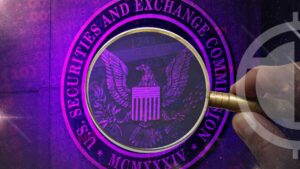
CryptoLark’s Lark Davis draws attention to the recent FUDs (fear, uncertainty, and doubt) that continue to plague the Cryptoverse—Silvergate, Mt. Gox, et. al.
The cryptocurrency market saw its total cap fall from $1.07 trillion to $1.02 trillion in under an hour on March 3. This anomaly emanates from various unfavorable events, viz. the Silvergate crash, the news of Mt. Gox creditors receiving their Bitcoin (BTC) reimbursements soon, etc.
Sharing the list of the recent FUDs in the Cryptoverse, Lark Davis tweeted:
Let us briefly examine these recent Cryptoverse FUDs:
1. Silvergate FUD
The Silvergate Capital FUD has led its stock to reportedly plummet 57% owing to a delayed annual 10-K report. Silvergate stated in its official filing that it is “currently analyzing certain regulatory and other inquiries and investigations.”
The U.S. SEC (Securities and Exchange Commission) noted in its FORM 12b-25 notification of late filing served to Silvergate,
Silvergate Capital Corporation (the “Registrant” or “Company”) has determined that it is unable to file with the Securities and Exchange Commission (the “SEC”) its Annual Report on Form 10-K for the fiscal year ended December 31, 2022 (the “Form 10-K”), within the prescribed time period without unreasonable effort or expense.
In a “risk-based decision,” Silvergate Bank ceased its Silvergate Exchange Network (a cryptocurrency payments network), citing doubt on its viability.
Silvergate shares have fallen over 97% from their all-time high in November 2021.
The official Silvergate statement read, Effective immediately Silvergate Bank has made a risk-based decision to discontinue the Silvergate Exchange Network (SEN). All other deposit-related services remain operational.
2. Mt. GOX BTC FUD
Before collapsing in 2014, Mt. Gox was the world’s largest centralized crypto exchange. The exchange suffered from a hack leading it to reportedly lose 850K BTC. Mt. Gox was reportedly able to recover 20% of the total hack or 142K BTC, 143K Bitcoin Cash (BCH), and 69BN Yen.
Crypto Rand tweeted:
On March 10, the defunct crypto exchange Mt.Gox’s creditors would be distributed their funds. Per its Japanese bankruptcy trustee, September 30 is the deadline for repayment.
UBS Analyst Ivan Kachkovski noted, New supply could still come to the market, but this at least implies it would be less concentrated. It’s certainly difficult to estimate the extent to which the market has been pricing massive sales coming from Mt.Gox.
Instead of waiting 3 to 5 years, via the Early Lump-Sum Repayment, creditors can recover approximately 15%-25% of their exchange holding. Via the liquidity option, the two largest Mt. Gox creditors (Bitcoinica and MtGox Investment Funds or MGIF) reportedly intend to get their funds in BTC and not in dollars. This would prevent BTC from getting liquidated.
3. ETH Unlock FUD
The Ethereum (ETH) Shanghai Hard Fork’s March 2023 activation would also result in a token unlock of a minimum of 35,008 ETH. To enable ETH unlock, the data storing and transaction processing-nodes need to check if they have updated withdrawal credentials.
The Ethereum community members that staked 32 ETH in the ETH2 deposit contract need to update validator nodes’ withdrawal credentials to initiate an exit, cease validation, and withdraw the staked ETH balance. Ethereum’s largest staking pool, Lido, is set to decide if to sell or stake its $30 million worth of Ether.
4. Binance FUD
Changpeng Zhao or CZ, CEO, Binance, recently responded to the “Binance FUD” article by Forbes citing a “shuffling” of funds, saying,
They don’t know how an exchange works.
The said “shuffling” of funds relates to moving $400 million from Binance.US account (operating as BAM Trading Services) at Silvergate Bank (California) to Merit Peak, a firm linked to CZ. Notably, per Kimberly Soward, a Binance spokesperson, Merit Peak was “neither trading nor providing any kind of services on the Binance.US platform.”
Binance.US spokesperson reportedly maintained that access to its accounts was only available to its employees, apparently including those at Silvergate Bank.
Clearing the doubts of Forbes, CZ tweeted:
5. Federal Reserve Bank FUD & Regulation FUD
The United States Federal Reserve (FED) interest rate and its association with cryptocurrency markets is enticing. Bitcoin and the stock market also correlate in terms of the stock market volatility index (VIX) and investors’ recessionary sentiments.
But the FED’s crypto stance isn’t motivating just like that of the U.S. SEC. Recently, the Board of Governors of the Federal Reserve System presented an interpretation of section 9(13) of the Federal Reserve Act governing the use of digital assets in the federal banking ecosystem.
The final rule cites the “significant risks” of the cryptocurrency sector (viz. fraud, legal uncertainty, and volatility).
The rule reads, With respect to any novel and unprecedented activities, such as those associated with crypto-assets or use of distributed ledger technology, it is particularly important for a state member bank to have in place appropriate systems to monitor and control risks.
The U.S. SEC (boosting its crypto unit) has actively been probing cryptocurrencies and digital asset firms (e.g., penalizing Kraken), terming most crypto as unregistered securities. The Binance.US, per SEC’s Senior Trial Attorney William Uptegrove, is operating as an ‘unregistered securities exchange.’ SEC Chair Gary Gensler notes,
To be clear, just because a crypto trading platform claims to be a qualified custodian doesn’t mean that it is.














